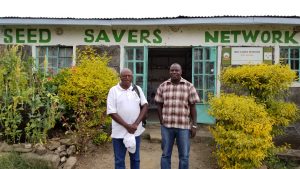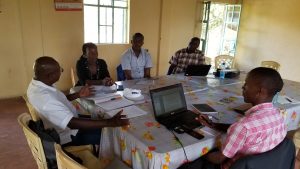By Jason Farr, visiting intern from American University, Washington, DC

In February of 2017 Seed Savers Network (SSN) participated in an open source seed system (OSSS) enterprises pitching event hosted by Hivos, a Netherlands based NGO featuring OSSS businesses ideas from around the globe. SSN won first prize for most innovative business idea for open source seed enterprises. According to Hivos, “The distinctive feature of ‘open source seed’ is an express and explicit commitment—legal and/or ethical—to maintain freedom to use the seed and any of its derivatives.”
SSN’s pitch was to create a tissue culture laboratory to clean and multiply farmers’ seeds and serve as a cold storage gene bank for local varieties. This event introduced SSN to the Kenya Climate Innovation Center (KCIC), who participated in the event as judges as well as scouts for the agribusiness ideas relevant to KCIC. SSN won in the category of most innovative OSSS enterprise idea for incorporating conservation of local varieties in a seed bank as well as improving the access to vegetatively propagated materials seeds to small holder farmers. For winning in this category, SSN was offered an opportunity to work with KCIC for one year as part of the KCIC mentorship program to support new entrepreneurial efforts in OSSS, with the possibility of receiving funding towards the project upon completion. Such funding would help SSN fulfill its goal of developing the tissue culture laboratory budgeted at KSh 5,300,000, allowing SSN to multiply and clean seeds for small holder farmers and to help promote the best varieties of the local plants farmers are growing.
So, what is a tissue culture laboratory and why is SSN planning to develop one? Some crops, like arrow root, cassava, sweet potatoes, yam, and Irish potatoes, are not multiplied through conventional seeds. These vegetative propagated crops require a tissue from a parent plant to be replanted for asexual reproduction, and can be multiplied through tissue culture. A tissue culture lab will allow SSN to multiply these crops for farmers to improve seed access. Through this process, one potato can produce an indefinite number of additional potato seeds.
However, if these cultures contain fungi, disease, or other impurities, it can have a devastating effect on a crop. For example, Irish potato is the second most important starch crop in Kenya after maize, but many of these crops have become infected with bacterial wilt disease that is spread through seeds. Because farmers cannot identify which seeds are infected, they must buy seeds or have their seeds cleaned to screen for diseases. If they do not, the use of diseased seeds can result in the loss of a whole crop. This is why seed cleaning is an important component of the laboratory. Seed cleaning will eliminate these elements from the seeds allowing for the rapid multiplication of clean seeds for the farmers working with Seed Savers.

As part of the award, Seed Savers is working with a mentor provided by KCIC to enhance the social entrepreneurship component of Seed Savers work to help ensure the success of the tissue culture laboratory, as well as to improve practices in ongoing entrepreneurial activities, like the sale of avocado trees and portable soil testing. The six-month long mentorship program requires six one-on-one meetings with Seed Savers mentor, former banker Tom Kore, as well as six meetings with Mr. Kore and another entrepreneur for group mentoring. According to Mr. Kore, “the overall objective of business mentorship is to motivate and guide the mentee in identifying and closing the gaps in his/her business that will enable him/her to establish sound business practices that will lead to better performance in terms of increased growth in sales, revenue, profits and market opportunities; efficient and effective business systems and internal controls; and an enhanced decision making process. At the of the day, an entrepreneur who has gone through mentorship stands a better chance to steer his/her business towards greater prosperity and sustained growth.”
As a community based organization largely reliant on donor funds, such entrepreneurial activities are designed to offer helpful services and products to farmers while providing Seed Savers with supplemental funding to support the work of promoting biodiversity and ecological agriculture through its work with small farmers around Kenya. Through the mentorship program and possible support from KCIC, SSN could be in a position to build its own tissue culture laboratory that would prove transformative for the organization and the farmers SSN works with.